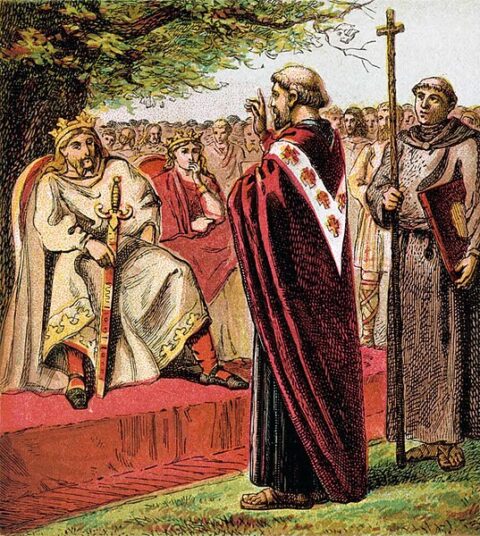Ed West‘s Christmas Day post recounted the beginnings of organized Christianity in England, thanks to the efforts of Roman missionaries sent by Pope Gregory I:

“Saint Augustine and the Saxons”
Illustration by Joseph Martin Kronheim from Pictures of English History, 1868 via Wikimedia Commons.
The story begins in sixth century Rome, once a city of a million people but now shrunk to a desolate town of a few thousand, no longer the capital of a great empire of even enjoying basic plumbing — a few decades earlier its aqueducts had been destroyed in the recent wars between the Goths and Byzantines, a final blow to the great city of antiquity. Under Pope Gregory I, the Church had effectively taken over what was left of the town, establishing it as the western headquarters of Christianity.
Rome was just one of five major Christian centres. Constantinople, the capital of the surviving eastern Roman Empire, was by this point far larger, and also claimed leadership of the Christian world — eventually the two would split in the Great Schism, but this was many centuries away. The other three great Christian centres — Jerusalem, Alexandria, and Antioch — would soon fall to Islam, a turn of events that would strengthen Rome’s spiritual position. And it was this Roman version of Christianity which came to shape the Anglo-Saxon world.
Gregory was a great reformer who is viewed by some historians as a sort of bridge between Late Antiquity and the Middle Ages, the founder of a new and reborn Rome, now a spiritual rather than a military empire. He is also the subject of the one great stories of early English history.
One day during the 570s, several years before he became pontiff, Gregory was walking around the marketplace when he spotted a pair of blond-haired pagan slave boys for sale. Thinking it tragic that such innocent-looking children should be ignorant of the Lord, he asked a trader where they came from, and was told they were “Anglii”, Angles. Gregory, who was fond of a pun, replied “Non Angli, sed Angeli” (not Angles, but angels), a bit of wordplay that still works fourteen centuries later. Not content with this, he asked what region they came from and was told “Deira” (today’s Yorkshire). “No,” he said, warming to the theme and presumably laughing to himself, “de ira” — they are blessed.
Impressed with his own punning, Gregory decided that the Angles and Saxons should be shown the true way. A further embellishment has the Pope punning on the name of the king of Deira, Elle, by saying he’d sing “hallelujah” if they were converted, but it seems dubious; in fact, the Anglo-Saxons were very fond of wordplay, which features a great deal in their surviving literature and without spoiling the story, we probably need to be slightly sceptical about whether Gregory actually said any of this.
The Pope ordered an abbot called Augustine to go to Kent to convert the heathens. We can only imagine how Augustine, having enjoyed a relatively nice life at a Benedictine monastery in Rome, must have felt about his new posting to some cold, faraway island, and he initially gave up halfway through his trip, leaving his entourage in southern Gaul while he went back to Rome to beg Gregory to call the thing off.
Yet he continued, and the island must have seemed like an unimaginably grim posting for the priest. Still, in the misery-ridden squalor that was sixth-century Britain, Kent was perhaps as good as it gets, in large part due to its links to the continent.
Gaul had been overrun by the Franks in the fifth century, but had essentially maintained Roman institutions and culture; the Frankish king Clovis had converted to Catholicism a century before, following relentless pressure from his wife, and then as now people in Britain tended to ape the fashions of those across the water.
The barbarians of Britain were grouped into tribes led by chieftains, the word for their warlords, cyning, eventually evolving into its modern usage of “king”. There were initially at least twelve small kingdoms, and various smaller tribal groupings, although by Augustine’s time a series of hostile takeovers had reduced this to eight — Kent, Sussex, Essex, and Wessex (the West Country and Thames Valley), East Anglia, Mercia (the Midlands), Bernicia (the far North), and Deira (Yorkshire).
In 597, when the Italian delegation finally finished their long trip, Kent was ruled by King Ethelbert, supposedly a great-grandson of the semi-mythical Hengest. The king of Kent was married to a strong-willed Frankish princess called Bertha, and luckily for Augustine, Bertha was a Christian. She had only agreed to marry Ethelbert on condition that she was allowed to practise her religion, and to keep her own personal bishop.
Bertha persuaded her husband to talk to the missionary, but the king was perhaps paranoid that the Italian would try to bamboozle him with witchcraft, only agreeing to meet him under an oak tree, which to the early English had magical properties that could overpower the foreigner’s sorcery. (Oak trees had a strong association with religion and mysticism throughout Europe, being seen as the king of the trees and associated with Woden, Zeus, Jupiter, and all the other alpha male gods.)
Eventually, and persuaded by his wife, Ethelbert allowed Augustine to baptise 10,000 Kentish men on Christmas Day, 597, according to the chronicles. This is probably a wild exaggeration; 10,000 is often used as a figure in medieval history, and usually just means “quite a lot of people”.



